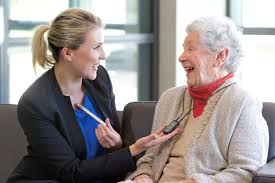Communication tips and exercises
Communication tips or hearing tactics are ways to help with the conversation breakdown that can occur when someone’s hearing is not at its optimal best. When you experience a drop in your hearing levels, lots of things you took for granted with your hearing, disappear and you find yourself working much harder to follow conversations. There are tips you and your loved ones can follow to ease the stress associated with communication breakdown in these situations. You can use these tips both with and without your hearing aids.

- Turn down any background noise when having a chat with someone at home - turn off TV, radio, music - so you can focus on the conversation. If you’re in the car, turn off the radio and wind up the window to cut out traffic noise. Heading to a restaurant? Call ahead and ask if you can sit in a quiet corner. When choosing your seat, make sure your back is to the wall – that way you will only be getting noise from the sides and to the front, which will help focus the sound you want to hear.
- Have conversation in a well-lit area. When we listen, we read lips and read facial expressions. This is hard to do in a dimly-lit room. Make sure you can see the speaker’s face clearly. All the cues you get from their face will add to the hearing information you’re receiving, helping you piece together the conversation. Give your communication partner clues as to how they can help you hear better - slow their speech just a little (not too slow – you want to get the flow of the conversation) and to raise their voice level slightly (no shouting as this distorts the sound).

- Ask your family and friends not to talk to you from another room. Sound doesn’t travel well through walls or around corners, even for people with good hearing! Conversation is easier when everyone is in the same room. Ask people to either call your name or tap you on the shoulder before they initiate conversation. You want to be focused on what they say, not miss the first part because you haven’t realised you were being spoken to.
- Find the best place to sit when you’re in large venues (theatre, church, community hall, meeting room). This may be in the front row or where the loop system is (loop systems are useful to know about – find out if your hearing aid is equipped with a Telecoil). Prepare yourself as much as possible before attending outside events. Read the synopsis of the movie, get the agenda of a meeting before you attend, and discuss what went on afterwards with your communication partners. Not only will this reinforce what you heard but will also help improve your auditory memory.
- Tell people you have a hearing loss. Most people are willing to adjust their communication process if they know you can’t hear as well as others. Help them understand what will help you hear better – face you, speak a little slower, raise their voice a little, turn down background noise where possible. If you miss part of what has been said, repeat back what you heard then ask them to recap on the bits you missed. This shows you have been paying attention - and will make the conversation process easier.

Communication exercises
All of us could improve our communication skills. In a connected world of technology, we often spend more time looking at screens than having conversations with our loved ones. Becoming a good communicator takes skill and practice. Most importantly, we need to listen to what our communication partner is saying – and this can be challenging if your hearing levels are compromised. Below are a couple of easy communication exercises to try. These will not only help your communication, but increase your auditory memory, but teach you how to be an ‘active listener’.

Communication exercise #1
To build up your auditory memory here’s a simple exercise you can do with your partner every day.
- Put on your hearing aids.
- Choose something you like to read – the newspaper, a book or magazine.
- Ask your partner to read passages from it.
- Listen to what is being read out to you.
- Repeat back what you’ve heard – word for word (without missing a single point!)..
- Start with short phrases or sentences. If you miss a word, get your partner to read the section again until you get it word perfect.
You’ll find over time, you’re able to remember longer passages and repeat them back without a mistake. This exercise will improve your auditory memory and help your overall cognitive function.

Communication exercise #2
To avoid being a conversation dominator or conversely, a conversation avoider, this exercise will teach you how to be a fair contributor in the communication process. For good communication, both parties are involved by asking questions and listening to responses equally. Here is another exercise for you and your communication partner to try:
- Put on your hearing aids.
- Select a topic of conversation. The topic must be something you’re both interested in – for example, Hiking.
- Get a timer and set it for one minute.
- You start to the conversation on Hiking by making a statement such as: “I’ve been reading about hiking in New Zealand. Would you like to do a hike there?”
- Your partner then makes a comment - “That sounds interesting. I’ve always wanted to hike the Milford Sound track. Have you read about that one?”
- You then respond and continue on in this way for the full sixty seconds.

Sounds easy? Not at first. Good communication habits take a bit of practice. If you’ve been a dominator, it may take time for you to learn how to involve others in a conversation. And if you are a conversation avoider you may find it hard to contribute, and just want to let the other person do the talking. For this exercise to work, you must stick to the topic, not stray off on to something else, and communicate effectively for the entire minute – and wear your hearing aids. Once you’ve mastered one minute of chat, increase the time. It won’t take long before you and your partner will be demonstrating good communication skills and be able to share equally in the process.
Next Article --> Travelling with hearing aids
Previous Article --> Wearing your hearing aids successfully
